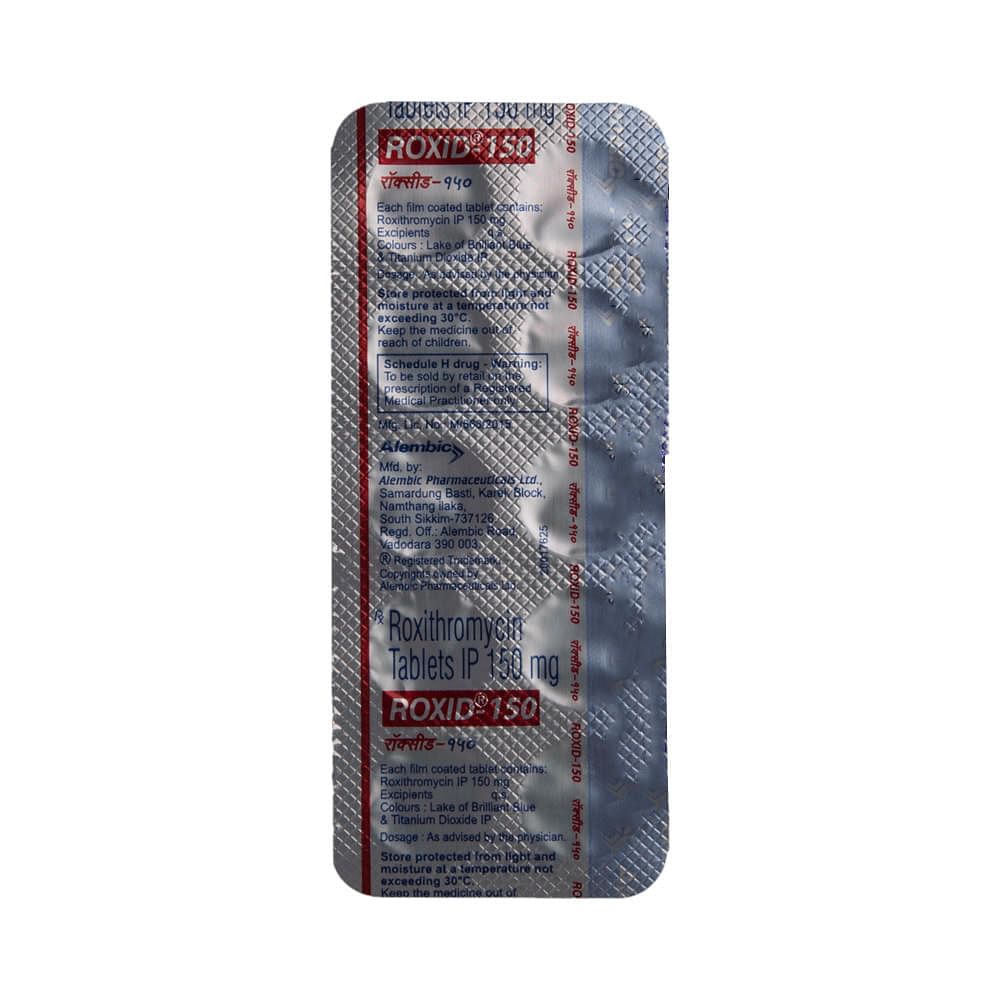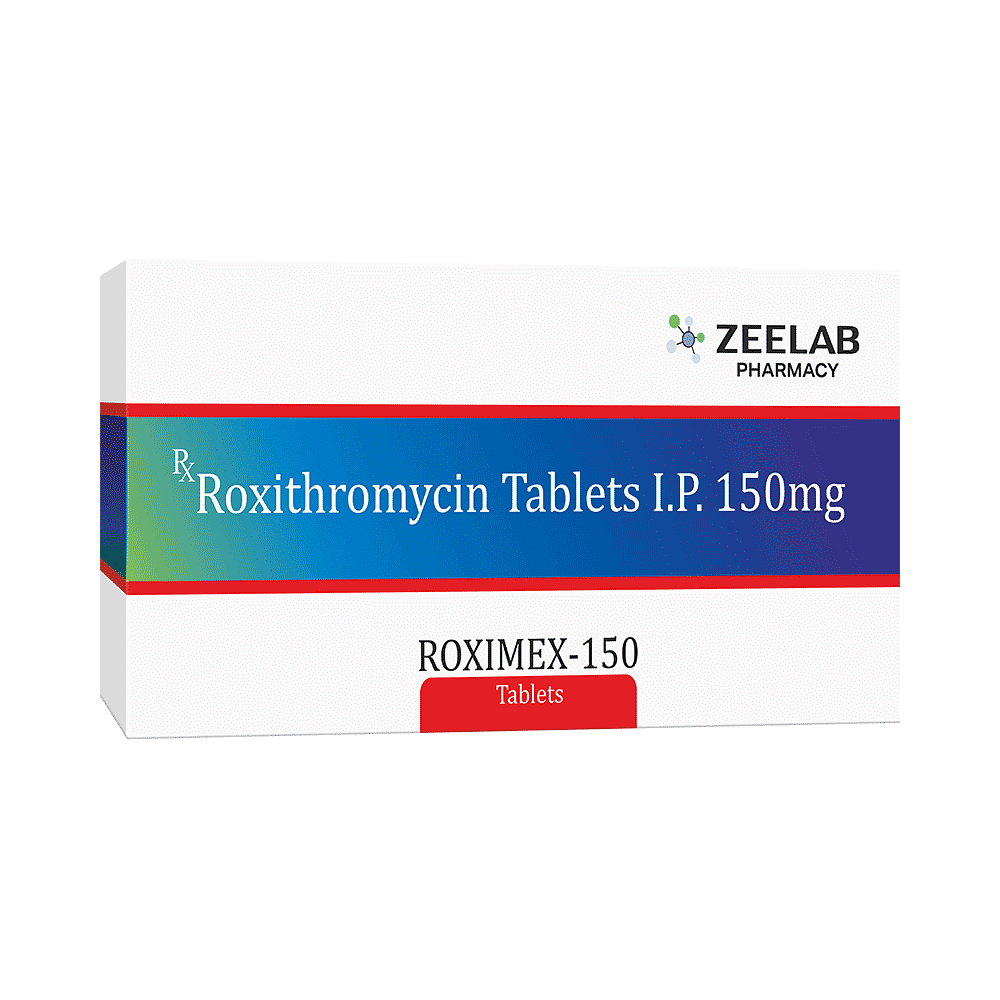
Throxid 150mg Tablet
Manufacturer
Vostok & Wilcure Remedies
Salt Composition
Roxithromycin (150mg)
Key Information
Short Description
Throxid 150mg Tablet is an antibiotic used to treat various types of bacterial infections, effective in resolving most infections of the respiratory tract, ear, nose, throat, lungs, and skin.
Dosage Form
Tablet
Introduction
Throxid 150mg Tablet should be taken by mouth on an empty stomach. It should be used regularly at evenly spaced time intervals as prescribed by your doctor. Do not skip any doses and finish the full course of treatment even if you feel better. Stopping the medicine too early may lead to the infection returning or worsening. Commonly seen side effects seen with this medicine include nausea, vomiting, pain in the abdomen, and diarrhea. These are usually temporary and subside with the completion of treatment. Consult your doctor if these side effects do not resolve or persist for a longer duration. Inform your doctor if you have any previous history of allergy or heart problems before taking this medicine. Pregnant or breastfeeding women should consult their doctor before using this medicine.
Directions for Use
Take this medicine in the dose and duration as advised by your doctor. Swallow it as a whole. Do not chew, crush or break it. Throxid 150mg Tablet is to be taken empty stomach.
Safety Information
Side Effects
Diarrhea may occur as a side effect but should stop when your course is complete. Inform your doctor if it doesn't stop or if you find blood in your stools.
Alcohol Warning
Consuming alcohol with Throxid 150mg Tablet does not cause any harmful side effects.
Breastfeeding Warning
Throxid 150mg Tablet is safe to use during breastfeeding. Human studies suggest that the drug does not pass into the breastmilk in a significant amount and is not harmful to the baby.
Pregnancy Warning
Throxid 150mg Tablet is generally considered safe to use during pregnancy. Animal studies have shown low or no adverse effects to the developing baby; however, there are limited human studies.
Interacting Medicines
Astemizole Disopyramide Ebastine Lovastatin
How it works
Throxid 150mg Tablet is an antibiotic. It works by preventing synthesis of essential proteins required by bacteria to carry out vital functions. Thus, it stops the bacteria from growing and prevents the infection from spreading.
Quick Tips
Do not skip any doses and finish the full course of treatment even if you feel better. Stopping it early may make the infection to come back and harder to treat. Take it 1 hour before or two hours after food. Do not take antacids 2 hours before or after taking Throxid 150mg Tablet. Diarrhea may occur as a side effect but should stop when your course is complete. Inform your doctor if it doesn't stop or if you find blood in your stools. Stop taking Throxid 150mg Tablet and inform your doctor immediately if you develop an itchy rash, swelling of the face, throat or tongue or breathing difficulties while taking it.
Related Medicines

Roxid 150 Tablet

Roxot 150mg Tablet

J Roxy 150mg Tablet

Roximex 150 Tablet

Rovit 150mg Tablet

Roxitem 150mg Tablet

Roxygo 150mg Tablet

Roxon 150mg Tablet

Roxiter 150mg Tablet

Pinrox 150mg Tablet
Frequently asked questions
Is Throxid 150mg Tablet safe?
Throxid 150mg Tablet is generally considered safe when taken for the prescribed duration and dosage as recommended by your doctor.
Does Throxid 150mg Tablet treat urinary tract infections (UTI)?
Throxid 150mg Tablet can be used to treat certain types of lower urinary tract infections, such as those affecting the bladder and urethra. It is important to note that this medicine should only be taken after consulting with your doctor for proper diagnosis and treatment.
Can the use of Throxid 150mg Tablet cause diarrhea?
Yes, some individuals may experience diarrhea as a side effect of Throxid 150mg Tablet. This is because it can disrupt the balance of bacteria in your gut.
How long does Throxid 150mg Tablet take to work?
Throxid 150mg Tablet often starts working shortly after taking it. However, complete healing may take a few days as it can require some time for the medication to kill all harmful bacteria.
What if I don't get better after using Throxid 150mg Tablet?
Inform your doctor immediately if you do not feel better after completing the full course of treatment. It is also important to inform them if any symptoms are worsening.
Can I stop taking Throxid 150mg Tablet when my symptoms are relieved?
No, you must complete the full course of therapy as prescribed by your doctor even after you experience improvement in symptoms. This is important to ensure that all bacteria responsible for the infection are killed.
Can the use of Throxid 150mg Tablet cause infertility?
There is no current evidence suggesting that the use of Throxid 150mg Tablet will directly lead to infertility in either males or females.
Is Throxid 150mg Tablet an antibiotic?
Throxid 150mg Tablet is an antibiotic and belongs to the macrolide class. It works by preventing bacteria from growing, interfering with their protein synthesis.


